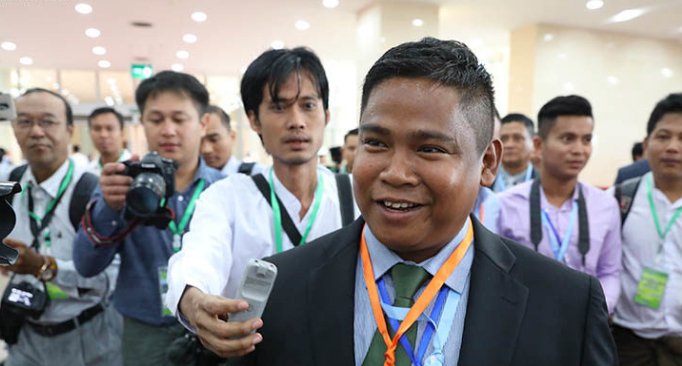HTET NAING ZAW: NAYPYITAW—The Myanmar government will not invite the Arakan Army (AA), which it has designated as a terrorist organization, to the Union Peace Conference-21st-Century Panglong, though it will invite the seven other ethnic armed organizations (EAOs) that have opted out of signing the Nationwide Ceasefire Agreement (NCA) with the government.
The Myanmar government will invite two leaders each from the seven NCA non-signatory groups, but not from the AA, which is engaged in active fighting with government troops, government spokesman U Zaw Htay told reporters in Naypyitaw on Wednesday.
“We will invite seven non-signatories. But there are legal restrictions against inviting certain organizations, and we will not be able to invite them,” said U Zaw Htay, who is also the director-general of the State Counselor’s Office.
The seven non-signatories invited to the peace conference are the United Wa State Army (UWSA), Kachin Independence Army (KIA), Karenni National Progressive Party (KNPP), Shan State Progress Party/Shan State Army (SSPP/SSA), Ta’ang National Liberation Army (TNLA), National Democratic Alliance Army (NDAA) and Myanmar National Democratic Alliance Army (MNDAA).
The TNLA, MNDAA and AA have formed a military alliance known as the Brotherhood Alliance. According to TNLA spokesman Major Mai Aik Kyaw, the TNLA and MNDAA will not attend the peace conference if the AA is not invited.
“If the government is to invite us to the 21st-Century Panglong peace conference, we want to attend together. If we are to attend, all three of us must be allowed to attend. This is the stance of all three groups,” he told The Irrawaddy.
Analysts of the Rakhine conflict and Myanmar’s peace process urged the government to invite the AA to the conference.
“The AA should be invited. The government says the reason it would not invite the AA is because it has declared it a terrorist organization. But without negotiating with the AA, the Rakhine issue can’t be resolved. So, I think the AA should be invited and negotiations held to ease military tensions,” said political analyst and writer U Than Soe Naing.
Rakhine affairs analyst U Maung Maung Soe said the AA should not be left behind if all the EAOs based in northern Myanmar are to be invited to the peace talks. Other groups are unlikely to attend the talks if the AA is not invited, he said.
“The government always says it keeps the door open to negotiations with the Northern Alliance, including the AA. If it is keeping the door open, it should invite [the AA], even though NCA non-signatories cannot participate in discussions. The invitation will pave the way for negotiations with the Northern Alliance,” he said.
The Northern Alliance is a four-member military alliance that consists of the KIA, the MNDAA, the TNLA and the AA.
The Irrawaddy was unable to contact KIA and AA spokesmen for comment.
The government decided not to invite the AA to the peace conference because it has been designated as a terrorist organization, said Myanmar military spokesman Major-General Zaw Min Tun.
The government will also not invite the National Socialist Council of Nagaland-Khaplang (NSCN-K) to the peace talks. The armed group attended the third session of the Panglong Peace Conference in July 2018.
“We will invite two leaders each from signatory and non-signatory groups. They are not allowed to send representatives. Only the invited leaders will be allowed to attend,” U Zaw Htay said.
Nai Ong MaNge, a spokesman for the NCA signatories, said the signatories officially asked government officials to invite the non-signatories to the talks, and the government responded that it would do so, except in the case of the AA.
Eight EAOs—the Karen National Union, the Karen National Liberation Army-Peace Council (KNLA-PC), the Democratic Karen Benevolent Army (DKBA), the Restoration Council of Shan State/Shan State Army (RCSS/SSA), the All Burma Students’ Democratic Front (ABSDF), the Arakan Liberation Party (ALP), the Chin National Front (CNF) and the Pa-O National Liberation Organization (PNLO)—signed the NCA with former President U Thein Sein’s administration in 2015.
Two others—the New Mon State Party (NMSP) and the Lahu Democratic Union (LDU)—signed the NCA with the National League for Democracy-led government in February of 2018.
The government will also invite five representatives from a civil society organizations forum, but observers will not be invited due to COVID-19, U Zaw Htay said.
The government and NCA signatories met on Tuesday and Wednesday in Naypyitaw, with talks focusing on the framework for NCA implementation, future tasks after 2020, and basic principles.
The fourth session of the Union Peace Conference will last for three days starting on Aug. 19. At the conference, the Union Peace Dialogue Joint Committee will meet and agreements reached will be signed under the third part of the Union Accord. News Source:Irrawaddy
Translated from Burmese by Thet Ko Ko

